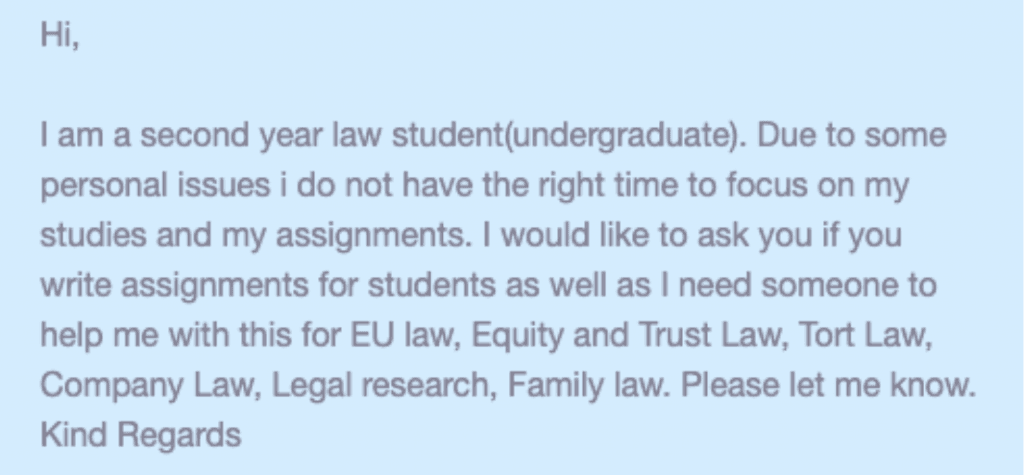Approached by mystery man on behalf of wealthy law student

A University of Edinburgh law grad was offered £1,000 yesterday to sit someone else’s online exam.
Hannah Smethurst received the approach via an online tutoring platform by a man offering professional cheating services to wealthy students. The experienced private tutor was offered the cash plus the cost of her travel to London in exchange for sitting a four-hour online business law exam.
The revelation will raise concerns about the integrity of law degrees now that so many exams have moved online.
Smethurst, who did her undergrad at King’s College London, is now qualifying as a lawyer in Scotland after doing a master’s in Edinburgh. Private tutoring helps cover the costs of her further studies.
She told Legal Cheek that she was approached through a legitimate tutoring website yesterday by someone claiming to need help preparing for a law exam and arranged a call to discuss it. It quickly became clear that this was a dodgy deal, with the caller apparently telling her:
“I didn’t want to write this down but it’s actually for my friend who needs some help with his exam. And when I say help, I’ll be very honest with you: I’m going to ask you to sit his exam for him.”
The pitch continued: “I understand that might not be something you’re comfortable with, so we’re going to pay you a premium rate.”
Smethurst says she was offered £1,000 in cash plus the cost of her travel to London, where she would sit the exam in a conference room hired by the caller, and any other expenses incurred if she wanted to gad around London for the day.
When Smethurst pointed out that, quite apart from the cheating aspect, getting a train from Edinburgh to London in the middle of a pandemic was out of the question, her interlocutor replied “I’m not here to be judged”.
She reckons the cheating ring is highly organised. The caller appeared to be running a concierge service where wealthy students can request that someone be found to sit their exam or write their essays — without having to get their own hands dirty. Smethurst says she would never have met or interacted with the student whose exam she was sitting.
The professional nature of this approach may be unusual, but tutors are often asked to turn their hand to outright cheating on behalf of loaded undergrads.
“It’s always students with a lot of money”, the future lawyer reckons. “I get a lot of legitimate tutoring enquiries from across the socio-economic scale, but the students who just want me to do it for them are all students or parents with a considerable amount of money. They’ll say ‘I’ve gone on holiday and I just don’t want to do it. I’m in our third home, would you mind doing it for me? I’ll pay you whatever you want'”.
The exam in question was part of a master’s in business law offered online by an American law school. But it’s only a particularly blatant example of a phenomenon that also affects UK law schools.
“With all kinds of legal exams — LLB, master’s — I’ll get a notification asking for help and a lot of them say ‘will you just do this for me?'”, Smethurst told Legal Cheek. She’s got the screenshots to prove it; this is just one of several examples:

Smethurst, who has been tutoring for eight years, says that she’s always received enquiries like this — but the move to remote exams has seen led to a sharp rise.
“Definitely since everything’s gone online there’s been a huge uptick”, she says. Some types of exam are more secure than others: where students have a 48-hour window to complete a take-home test, it’s much easier to cheat than if they have to sit it in real time.
Concerns about exam integrity lay behind the reluctance of regulators to allow barrister and solicitor exams to be taken online. Virtual bar exams taking place this month are being supervised over webcam — but the stringent security measures have their own costs, with students refused permission to take toilet breaks having to relieve themselves in view of the proctor.

